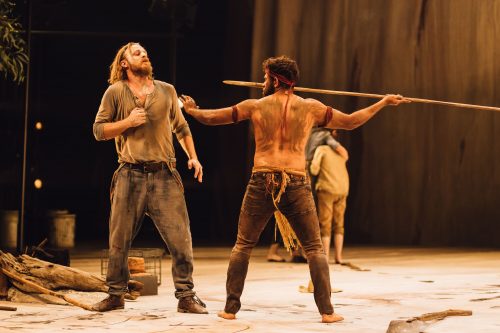 United Kingdom The Secret River by Kate Grenville (adapted for the stage by Andrew Bovell): National Theatre, London, 28.8.2019. (CSa)
United Kingdom The Secret River by Kate Grenville (adapted for the stage by Andrew Bovell): National Theatre, London, 28.8.2019. (CSa)

Production:
Director – Neil Armfield
Artistic associate – Stephen Page
Set designer – Stephen Curtis
Costume designer – Tess Schofield
Lighting designer – Mark Howett
Composer – Iain Grandage
Musical director – Isaac Hayward
Language consultant – Richard Green
Cast:
Sal Thornhill – Georgia Adamson
Dan Oldfield – Joshua Brennan
Dick Thornhill – Toby Challenor
Ngalamalum – Shaka Cook
Wangarra/Branyimala – Marcus Corowa
William Thornhill – Nathanial Dean
Musician – Isaac Hayward
Mrs Herring – Melissa Jaffer
Buryia/Dulla Djin – Elma Kris
Dhirrumbin – Pauline Whyman
Narabi – Dylan Miller
Thomas Blackwood – Colin Moody
Dulla Djin’s child – Jacob Narkle
Garraway – Wesley Patten
Willie Thornhill – Rory Potter
Smasher Sullivan – Jeremy Sims
Loveday – Bruce Spence
Yalamundi – Major ‘Moogy’ Sumner AM
Turnkey – Matthew Sunderland
Gilyagan – Dubs Yunupingu
A good story well told makes for gripping theatre from director Neil Armfield. After its hugely successful production of The Lehman Trilogy, the National is currently staging the Sydney Theatre Company’s The Secret River following its sell-out run at the Edinburgh International Festival. Based on the novel by Kate Grenville and skilfully adapted for the stage by Andrew Bovell, there are certain parallels with Stefano Massini’s Lehman family epic. Both plays concern the fate of families of oppressed and penniless nineteenth century European immigrants as they attempt to survive and prosper on new continents, and both use third party narrative as a device for moving the story along. But the similarities end there.
The Lehman brothers emigrated from Bavaria to Montgomery, Alabama in the 1840s, founded a cotton brokerage business and prospered. Tragedy did not strike until 140 years later, when the dynasty’s Wall Street investment house collapsed in spectacular fashion.
By contrast, tragedy stalks The Secret River’s central characters from the very start. William Thornhill (powerfully played by Nathaniel Dean) is a good-hearted, impoverished cockney from Southwark, savagely sentenced to transportation for life to a penal colony in New South Wales for stealing a plank of wood. Accompanied by his good-natured wife Sal (a compelling Georgia Adamson) and two young sons, he arrives in Sydney to learn that he has been pardoned by King George III. Now a free man, he and the family sail to the Hawkesbury River to settle and farm 100 acres of harsh indigenous terrain. Cultivating its rocky soil with little more than a spade and their own bare hands is backbreaking work, but better than returning to an impoverished life in London. The problem is that unknown to them, the indigenous Dharug people are the land’s historic owners and occupiers. Attempts to placate and then befriend the puzzled and increasingly resentful tribespeople are ultimately doomed to failure. ‘They are not like us’ William tells his wife. ‘They move across the land. We dig down.’ Colonial illusions of entitlement and permanence are of course the central theme underpinning this play.
There is shock and incomprehension on both sides when the Thornhills first encounter the imposingly bearded tribal elder Yalamundi (Major ‘Moogy’ Sumner) and a group of spear-carrying, Dharug-speaking younger tribesmen. Their seemingly aggressive exchanges are not translated, and the resulting confusion is intentional. ‘The Dharug characters’, writes Bovell, ‘are kept at a distance, only seen through the white characters’ eyes, and their actions and motivations are explained through the white characters’ comprehension and misinterpretation of them’. There are moments of flickering friendship, such as when Sal introduces Elma Kris’s Dulla Djin to the taste of sugar, but the only true connection is between William and Sal’s young son Dick (Toby Challenor) and the Aboriginal children, portrayed confidently by Jacob Narkle and Wesley Patten. They play together innocently, splashing and sliding happily in the mud or swimming naked with each other in the river – an incident which earns Dick a beating from his morally affronted father.
Yet, compared to other white settler neighbours – former convicts such as the cruel Smasher Sullivan (Jeremy Sims) who advocates violence and oppression from the start – William is neither a bigot nor a tyrant. As tensions between the colonisers and tribespeople ramp up, William is forced to confront the question of whether and how to protect his family and ‘his’ land. Sal begs her husband to abandon his dream and return with the family to London. It is William’s calamitous decision – which also serves as a symbol of Australia’s tragic colonial history – which lies at the very human heart of this play.
Tragic, too, that First Nations actor Ningali Lawford-Wolf who, as Dhirrumbin, narrated Grenville’s dark drama at Edinburgh, passed away days before the show transferred to London. Her role was amply filled at short notice by the accomplished Pauline Whyman. Fittingly, it is to Ningali, described by director Neil Armfield as ‘the spine of the work and its generous essence’, that the grieving company has dedicated The Secret River’s London run.
Chris Sallon
For more about what is on at the National Theatre click here.
